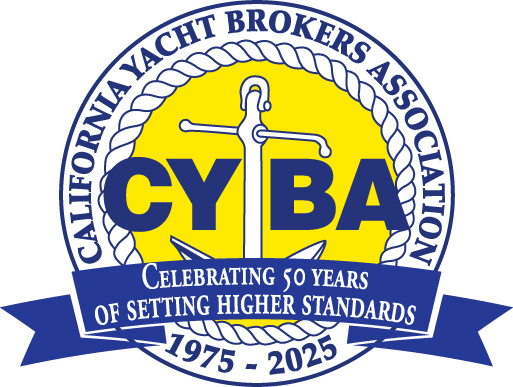

FIRST STATE TO REQUIRE LICENSING
California was the first state to require brokers and sales personnel to be licensed and bonded. The efforts of the California Yacht Brokers Association goes beyond that which is required by law and offers further protection and services to the consumer. Examples that we are proud of include our Code of Ethics that is recognized nationwide as the cornerstone and standard for professional conduct, our Arbitration Process to settle disputes between consumers and brokers, and educational material such as our “Buying a Used Boat” page.

ARTICLE XV: CODE OF ETHICS
Section 1. – Protecting the Public
It is the duty of the Member to protect the public against fraud, misrepresentation, or unethical practices in the yacht brokerage profession. Members should endeavor to eliminate any practices which could be damaging to the public or to the dignity and integrity of the yacht brokers Association in regulating the practices of Brokers and Salespersons in California.
Section 2. – Fiduciary Duty to Client
In accepting a position as an agent, Member pledges himself to protect the interests of his client. This obligation of absolute fidelity to the client’s interest is paramount, but it does not relieve the Member from obligation of dealing fairly with all parties to the transaction.
Section 3. – Dual- Agency
Since the Member may be representing one or more parties to a transaction, he should not accept compensation from more than one party under any circumstance, without the full knowledge of all parties to the transaction.
Section 4. – Agreements in Writing
Member, for the protection of all parties with whom he deals, should see that financial obligations and commitments regarding brokerage transactions are in writing and express the exact agreement of the parties. Copies of such agreements must be placed in the hands of all parties involved at the time the agreements are executed, or as soon thereafter as practical.
Section 5. – Segregation of Funds
Member must segregate from his own funds all monies being held for other persons. Special bank trust accounts must be used for this purpose.
Section 6. – False Consideration and Deposits
Member should not be a party to the naming of a false consideration in any document or statement. No offer should be submitted either to an owner or to a cooperating Broker, without adequate cash deposit on hand from the offered.
Section 7. – Nature of Deposits
No offer should be presented to a seller, or a cooperating brokerage, without specifying the exact nature of the deposit.
Section 8. – Multiple Offers
In the event that more than one written offer on a specific vessel is made before the owner has accepted any offer, any other written offer presented to the Member, whether by a prospective purchaser or another brokerage, should be transmitted immediately or as soon as practical to the owner for his decision. In the event of an accepted offer, Member is required to present to seller any and all additional offers to purchase.
Section 9. – Accuracy of Facts, Misrepresentation Thereof
Member should use his best efforts to ascertain all pertinent facts concerning every vessel for which he accepts the agency so that he may fulfill his professional obligation to avoid error, exaggeration, misrepresentation or concealment of pertinent facts.
Section 10. – Knowledge of Current Markets
It is the duty of the Member to be well informed on current market conditions in order to be in a position to advise clients as to the fair market value of vessels.
Section 11. – Member Financial Interest in Vessels
Member should not acquire an interest in, or buy for himself, any member of his immediate family, his firm or any member thereof, or any entity in which he has substantial ownership interest, vessels listed with him, or his firm, without making the true position known to the listing owner. When selling vessels owned by him, or in which he has such interest, the facts should be revealed to the purchaser.
Section 12. – Appraisals
Member should not undertake to make an appraisal that is outside the field of his experience unless he obtains the assistance of an authority on such types of vessels, or unless the facts are fully disclosed to the client. In such circumstances, the authority so engaged should be identified and his contribution to the appraisal should be clearly set forth.
Section 13. – Recommending a Surveyor
Member should always recommend to the buyer that the buyer should select and employ, in a timely manner, an independent qualified marine surveyor as a condition precedent to the completion of a brokerage transaction.
Section 14. – For Sale Signs
Signs giving notice of any vessels for sale, rent, lease or exchange should not be placed on any vessel unless specifically authorized by the owner. There should not be more than one broker’s signage on a vessel.
Section 15. – Advertising and Listing Agreements
Member should not submit or advertise vessels without having a valid listing agreement, and in any vessel advertising, the price quoted should not be other than the gross price agreed upon with the owner as the vessel asking price.
Section 16. – Disclosure of Broker Status in Advertising
Member in his advertising should be especially careful to present a true picture and should neither advertise without disclosing hie identity, nor permit others in his brokerage entity to use individual names or telephone numbers, unless the connection with the Broker/ Brokerage is obvious in the advertisement.
Section 17. – Legal and/or Tax Advice
Member should not engage in activities that constitute the practice of law and / or accountancy and should recommend that legal and / or tax counsel be obtained when the tax liability or legal interest of either party requires it.
Section 18. – Co-ops and Broker Commissions
Member should cooperate with other Brokers on vessels listed with him whenever it is in the best interest of the client. All cooperative agreements should be executed as early as possible and prior to the submission of an Offer to Purchase, and should designate the percentage of the commission and all commission splits. Negotiations concerning a vessel listed on an exclusive/central basis with one Broker should be carried on with listing Brokerage, not the owner, except with express consent of the listing Broker.
Section 19. – Central Agency Listings
The agency of a Member who holds an exclusive / central listing should be respected. A Member cooperating with the listing Broker should not invite the participation of a third Broker without the express consent of the listing Broker
Section 20. – Respecting Competitors
A Member should not disparage the business practice of a competitor, nor volunteer an opinion of a competitor’s transaction. If his opinion is sought, it should be rendered with strict professional integrity and courtesy.
Section 21. – Sharing Information
A Member should not seek unfair advantage over his fellow Brokers and should willingly share with them the lessons of his experience and study.
Section 22. – Knowledge of Laws, Legislation
To better serve those who place their interests in his care, the Member should endeavor always to be informed regarding laws, proposed legislation, governmental orders, and other essential information and public policies which affect those interests.
Section 23. – Keeping Informed of Boating Issues
Member should keep himself informed as to activities affecting recreational boating in his community, state and the nation so that he will be better able to contribute to public thinking on matters of taxation, legislation, marine use, waterfront planning and other issues affecting boating interests.
Section 24. – Avoiding Controversy
A Member should conduct his business so as to avoid controversies with his fellow Brokers. In the event of a controversy between members, such controversy should be arbitrated in accordance with the arbitration procedures of the Association, rather than litigated.
Section 25. – Violation of Ethics
When a Member is believed to be in violation of ethical practice,, he must place all pertinent facts before the Ethics Committee of the Association for investigation and recommended action.
Section 26. – Settling Controversies
Controversies between parties who are Members or non-members should be submitted to arbitration in accordance with the arbitration rules of the California Yacht Brokers Association.
Section 27. – Loyalty to CYBA
It is in the best interest of society, of his associates, and of his own business that the Member be loyal to the California Yacht Brokers Association and be active in its work.
Section 28. – Ownership & Control of Surveys
All survey reports, photos and related documents are the property of the party that has paid for them, and should not be release by the Member to any individual or entity without the express, written consent of the party that owns said documents.
Section 29. – Plagiarism
To responsibly represent a client’s vessel and interests, Member shall at all times respect the intellectual property and creative efforts of a fellow broker, or others in the industry. In the event a Member is appointed listing agent on a previously listed vessel, any previous specification sheets, inventory lists, photos, survey reports, videos or internet postings shall not be copied and disseminated without written consent of the original author(s).

ARTICLE XIV: GRIEVANCE AND ARBITRATION
Section 1:
As a service to the yacht brokerage business and the yacht buying public, the Board of Directors may establish grievance and arbitration procedures to be administered by a Grievance and Arbitration Committee of the Association to be appointed by the Board of Directors. The Grievance and Arbitration Committee of the Association will not hear grievances or arbitrations directly, but will be responsible for the administration of the procedures established by the Board of Directors and ensuring compliance with those procedures.
Section 2:
There shall be three (3) members of the Grievance and Arbitration Committee who shall be appointed by the Board of Directors. Each member of the Grievance and Arbitration Committee shall serve for a three (3) year term except that the terms of the first Grievance and Arbitration Committee shall be staggered so that the term of only one member of the Committee will expire each year.
Section 3:
Grievances and Arbitrations to be heard will fall into one of the following categories:(a) Grievances between two or more Active Members of the Association. Submission of such grievance is voluntary.
(b) Grievances involving non-members of the Association.
(c) Grievances involving a member and another party to a transaction, or parties to a transaction involving a member.
(d) Grievances involving a non-member and another party or parties to a transaction.
Section 4:
The Grievance and Arbitration Committee will report to The Board of Directors at least monthly the number of grievances or arbitrations filed, the number of grievances or arbitrations heard, the disposition of such grievances or arbitrations and any other matters which may he of importance to the Board of Directors or may require action by the Board of Directors.
Section 5:
The Board of Directors may establish a schedule of fees and charges for the purpose of conducting the grievance and arbitration procedure. Such schedule of fees and charges shall give due regard to the membership of the Association.
